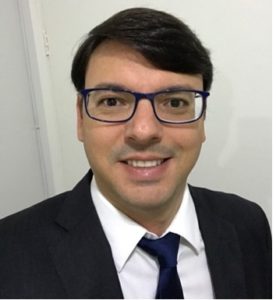Welcome to our Emerging Investigators Series 2022! This series, led by Prof Shirley Nakagaki (Federal University of Paraná, Brazil) and Dr Fabienne Dumoulin (Acıbadem Mehmet Ali Aydınlar Universit, Türkiye), highlights the very best work from early-career researchers in all areas of chemistry. 10 papers were published as part of the collection spanning the breadth of chemistry on topics ranging from green and environmental chemistry, to biological and bioinorganic chemistry, as well as papers that propose theoretical calculations as solutions to chemistry problems. You can read all about the contributions in this accompanying Editorial prepared by Shirley.
We would like to take this opportunity to highlight an author from the series, Prof Dr Julio Cezar Pastre. We interviewed Julio to find out more about his area of research and his contribution to the series.
Continuous flow Meerwein–Ponndorf–Verley reduction of HMF and furfural using basic zirconium carbonate
Henrique Magri Marçon and Julio Cezar Pastre
RSC Adv., 2022,12, 7980-7989
Julio C. Pastre obtained his PhD in 2009 under the guidance of Professor Carlos Roque D. Correia at the University of Campinas – UNICAMP. He then worked as a research scientist at Rhodia-Solvay before moving back to UNICAMP for postdoctoral studies with Professor Ronaldo A. Pilli. In 2012, he joined the group of Professor Steven V. Ley at the University of Cambridge. Two years later, Julio established his independent research group at UNICAMP and recently became an Associate Professor. In 2019, he was recognized as an ‘Emerging Investigator’ by Reaction Chemistry & Engineering and as a ‘New Talent from the Americas’ by RSC Medicinal Chemistry. Julio was chosen by the editorial boards of Synthesis, Synlett, and Synfacts as one of their ‘Thieme Chemistry Journals Awardees’ for 2023. His research interest focuses on the development of new synthetic methods in batch under microwave irradiation and under continuous flow conditions for the synthesis of platform molecules, new chemicals and APIs.
Could you briefly explain the focus of your article to the non-specialist and why it is of current interest?
In this work, we explored the valorization of two biobased chemicals (HMF and furfural) that can, for example, be used in the synthesis of polymers and are important intermediates to reduce our fossil-dependency and mitigate environmental issues.
How big an impact could your results potentially have?
By designing new synthetic methods that take full advantage of the capabilities of new enabling technologies, one will inevitably end up with greener, cleaner processes.
Could you explain the motivation behind this study?
We are keen to develop new processes for the synthesis of high value-added compounds from biomass derivatives in continuous flow regime.
In your opinion, what are the key design considerations for your study?
Our group has already identified continuous flow processing as a fundamental technology for the valorization of biomass derivatives, so that any designed methods can be rapidly scaled to manufacture. Moreover, many of the principles of Green Chemistry can be met by embracing new technologies that are inherently cleaner when compared to the traditional approaches.
Which part of the work towards this paper proved to be most challenging?
Although the process concerns just a reduction of an aldehyde, the obtention of a selective process is quite challenging since several competitive reactions can take place leading, for example, to the formation of humins.
What aspect of your work are you most excited about at the moment?
We are excited about the impact that flow chemistry can have in the valorization of biomass considering its key advantages, such as better control of heat and mass transfer, improved mixing, and safety profile.
How has your research evolved from your first article to this particular article?
Most of our previous works were done under homogeneous conditions. The use of heterogeneous catalysts in a fixed-bed reactor represents a good evolution in view of catalyst recycling, product separation and throughput.
What is the next step? What work is planned?
We want to apply these findings to other biobased chemicals and develop an integrated approach for the valorization of these materials.
Why did you want to publish in RSC Advances?
I’m a reader of RSC Advances, which publishes high impact research. So, it is a great pleasure to have our work published in such a prestigious journal.
What are your thoughts on open access publishing?
I believe open access publishing is going to be dominant soon since it gives access to a broader community and “democratize” science.

Submit to RSC Advances today! Check out our author guidelines for information on our article types or find out more about the advantages of publishing in a Royal Society of Chemistry journal.
Keep up to date with our latest Popular Advances articles, Reviews, Collections & more by following us on Twitter. You can also keep informed by signing up to our E-Alerts.











